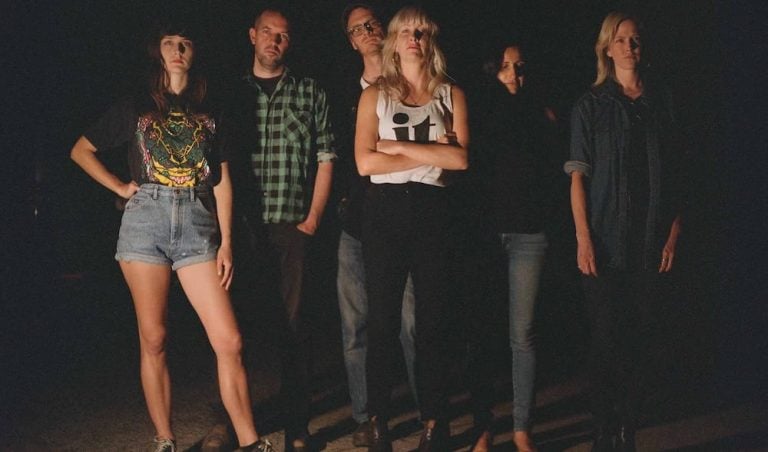Melbourne-based outfit Harmony have a reputation for gloom. Fronted by veteran Australian musician Tom Lyngcoln of intense rock outfit The Nation Blue, the band’s melancholic dissonance is paired with its three-piece chorus. The vocal section, which includes members of Tropical Fuck Storm and Time For Dreams, creates a stark and funereal contrast to the sounds of Tom, Alex Lyngcoln and Jon Chapple.
On new album Double Negative, however, there’s a distinctive yet elusive brightness hiding in the shadows, peering out at the seams. After two albums’ worth of malaise, it was time to make a change.
“I couldn’t subject myself to another misery fest again,” says Lyngcoln. “They’re hard on the heart and hard on the soul. I had to try something different after 10 years of pretty negative songwriting.”
Recorded at Kyneton Mechanics Hall by producer Mike Deslandes of High Tension, the natural acoustics of the setting add a lot of warmth throughout the album. It was the third recording Lyngcoln had done in the hall, the previous two being for The Nation Blue, which he admits didn’t quite suit the space.
“It was one of the things we didn’t have to chase down, because we knew exactly the sweet spot of each room,” explains Lyngcoln, who turned the hall into a makeshift lodging. “I enjoyed it. I’d go up and sleep there in the hall –with a cricket bat, because we had about $80,000 worth of gear sitting in the hall. You get to sit there and write lyrics at night and I love it; recording’s my favourite thing.”
Another likely reason for the warmth found on Double Negative is the fact its subject matter, too, marks a significant break from previous work. Moving from the oppressively bleak themes on previous album Carpetbombing, the new album sees Lyngcoln and co turn to love and matters of the heart for the source material.
Watch the video for ‘I Love You’ by Harmony below
Love Music?
Get your daily dose of metal, rock, indie, pop, and everything else in between.

For Lyngcoln, there was a level of vulnerability in turning away from what comes naturally to him as a songwriter – that is, negativity. “It was a pretty hard decision, to be honest. It’s a lot harder to write within a positive context. Negativity is really natural for me and I can wallow quite happily.”
While Double Negative may feature a more positive subject matter, it also manages to retain Harmony’s idiosyncratic sensibilities. For all of its atrial focus, the album never feels overly sentimental.
“My heart is open and love comes pouring in,” sings Lyngcoln on ‘Two Sides Of My Heart’ – only to remind listeners that “love is a chemical high, a complicated structure” on the following track. There’s a fairly narrative arc to it, too. Opening track ‘I Love You’ makes the promise to “tag along” despite love being a “rough ride”. By the album’s close, however, Lyngcoln paints love as “a pulsing fat arrhythmical curse / my heart’s about to fucking burst”.
It’s a lot harder to write within a positive context. Negativity is really natural for me and I can wallow quite happily.
Refusing to ever look through rose-coloured glasses, Double Negative examines and meditates on things like tenderness and intimacy for what they are – deeply complex, and often as painful as they are wondrous.
“Trying to find positive things to write about, and particularly something as broad as love, it’s really hard to not sound too cheesy,” explains Lyngcoln. It’s far easier, even in day to day conversations, to be self-deprecating rather than attempt to talk about these kind of things, he admits.
Watch the video for ‘Fatal Flaw’ by Harmony below

“I took it as a challenge. It was a completely different way of writing music for me. I’ve got a pretty long catalogue of pretty aggressive subjects and it’s not a challenge; that stuff’s really easy for me. So I wanted to let my writing grow a little bit, and find a way of writing about things that have been written about probably more than any other topic.”
The lyrical focus wasn’t the only thing that changed when writing Double Negative. Lyngcoln explains that the first two Harmony records were literally all first takes. “It was the very first time the song was being performed. I really enjoyed that immediacy. You’re hearing something that’s formative.”
For this album, however, Harmony rehearsed and recorded the songs together, making for a far more collaborative experience. It’s noticeable on the record – it feels more like a cohesive ensemble than two separate entities. “It’s a little bit more like a band as opposed to a set of song sketches we pieced together and manipulated.”
Ten years in, and Lyngcoln – who released his first solo album earlier this year – says that the band’s collaborative aspect has hit its sweet spot. “I know to leave a certain amount of space and I know what the people involved are going to bring to it. I’m never disappointed – the people in the band have a unique way of doing what they do and that lends itself to the songs. I kind of rely on it.”
It’s somewhat surprising, then, to think that when Harmony first began, it was imagined without the vocal component which is now one of its most intriguing aspects. “It transformed from what was a pretty run of the mill, meat and potatos ballad thing to something that reinvigorated it completely.”
Double Negative is out now through Poison City Records.

































